- Home
- Todd Strasser
Boot Camp Page 2
Boot Camp Read online
Page 2
I cross the lobby to the door, then stop and look back at him.
“Knock.”
I do as I’m told, and a gruff voice from inside says, “Come in.”
I push open the door. A stocky man sits at a desk, staring down at some papers through thin half-glasses, forehead wrinkled as if the act of reading takes intense concentration. His gray hair is cut short, and his nose is crooked, probably broken a long time ago. A small gold hoop pierces one earlobe. The rolled-up sleeves of his shirt reveal muscular forearms, and his hands are rough and faintly scarred, his fingers stubby and thick. He looks like someone who is used to working with those hands rather than sitting at a desk.
I wait while he reads. My head has begun to hurt. Craving coffee, I glance around the office, hoping there might be a pot brewing in some corner, but there isn’t. Instead there are dark-green file cabinets, some wooden chairs, a megaphone, and a wall map of the United States with different colored pins stuck into it.
Finally, he stacks the papers and places them in a folder. Looking at me for the first time, he holds the folder with both hands and wags it. “Kid hit his mother so hard, he broke her jaw.” He sighs as he says this. As if he’s never heard of such a thing before. “Tell me, Garrett, you ever hit your mother?”
“No.”
“No, sir,” he corrects, and gestures to a chair on the other side of the desk. “Sit down.”
I sit. His eyes are a washed-out gray, the color of hazy rain clouds. He makes a tent with his stubby fingers. “Welcome to Lake Harmony, Garrett. I’m Mr. Z, and I am the director of this facility. I assume by now you’ve figured out why you’re here. Your parents are paying a substantial amount of money because they are seriously concerned about your welfare. They want you to return home as soon as possible. How long you stay is up to you. I’ve seen students graduate after six months. Others have taken three years or longer. The choice is yours.”
He opens a desk drawer, takes out a thick, stapled document, and hands it to me. “This is your bible. Read it carefully. Study it. When you feel you’ve learned it completely, you may request a test. Once you have passed the test, you will be ready to join your fellow students.”
He pauses and gazes steadily into my eyes. “Any questions?”
“Can I get a cup of coffee … uh, sir?” I ask.
“You’ll be forgoing all caffeinated drinks during your stay here,” Mr. Z informs me. Hearing those words hurts almost as much as my headache. “Any other questions?”
“Sir, is it possible that someone could be sent here for the wrong reason?” I ask.
Those gray eyes don’t waver. Once again I have the feeling that this is a question he’s heard a thousand times before. Mr. Z shakes his head. “Children are sent here by their parents, Garrett.”
“And … parents are always right, sir?”
“That is the principle under which we operate. At least until a child reaches the age of emancipation,” Mr. Z replies.
“Eighteen?”
“Sorry?” he snaps.
“Eighteen … sir?”
“In most states.”
Another silence. I glance at the wall map. The densest collections of pins are near the large metropolitan areas on both coasts. Mr. Z knows what I’m looking at, but he makes no effort to explain its meaning. Instead, he asks, “Any other questions?”
“No … sir.”
“Very good. You can go.”
Back outside, the man in the black polo shirt takes me to yet another building. This one has classrooms. Inside, students sit at carrels working silently at computers. The walls of the carrels prevent them from seeing the other students. Men and women in black or white polo shirts sit at the backs of the rooms and watch.
I am taken to an empty classroom and shown to a carrel. “Study it,” the black shirt orders, nodding at the “bible” Mr. Z gave me. The introduction begins like this:
You are now a member of the Lake Harmony community. You will be released when you are judged to be respectful, polite, and obedient enough to return to your family. During your stay here you will have no communication with the outside world, except for letters to your parents. After six months your parents may visit you for a day if they choose.
Despite having had only a few hours’ sleep, not to mention the thumping caffeine headache, I manage to quickly read through the sixty-one-page document. It lists the rules: no talking, no touching, no disrespectful looks, etc. It describes the six levels one must rise through in order to be considered a candidate for “graduation.” It explains the system of points one must earn to climb from one level to the next.
After about forty minutes I raise my hand.
“Bathroom?” the black shirt asks.
“I’m ready for the test, sir.”
Black shirt frowns. “In less than an hour? No way. No one’s ready that fast. Read it again.”
I skim the bible again, then glance up. Black shirt doesn’t look happy. “You’re wasting my time,” he mumbles, placing some photocopied sheets on my desk. The sheets have been copied so many times, the black letters have blurred and run together. There are fifteen questions, with room for one- or two-sentence answers.
Why have you been sent to Lake Harmony?
What does manipulation mean?
What must you do to graduate?
It takes about twenty minutes to complete the test.
Black shirt gazes doubtfully when I motion that I’m finished, as if not only is it impossible to learn the whole bible as fast as I claim, but even more impossible to complete the test. The frown on his face only deepens when he reads my answers, pausing now and then to refer back to the bible to make sure they are correct.
He finishes marking the test and pauses, drumming his fingertips rhythmically against the table. He checks his watch, looks down at the test again, then goes to a phone on the wall and makes a call. After a while there’s a knock, and another black shirt sticks his head into the room. The two black shirts whisper, then come to a decision.
With one in front of me and the other behind, I’m escorted back to the windowless room with the metal bed. The black shirts sit in the chairs, while I remain standing, waiting for the next order. My parents have signed all the necessary legal documents … I’m here for a minimum of six months …
“Take a nap,” one black shirt tells me. “You must be tired.”
“Not really.” I should be tired, but I’m too wound up. And my head hurts too much.
“What?”
“Not really … sir.”
“Then sit down and shut up.”
This can’t be real…
My parents say I began sounding out words in picture books around the age of two and a half. At four I scored off the charts on the Chester Scale, the entrance exam for the city’s top private kindergartens. At age six I was figuring out square roots and adding radicals. For the first seven years of my life all I heard was how brilliant I was. Then, at the age of eight, I forged a letter from my mother excusing me from gym because of severe asthma. Sports were dumb, and I wasn’t good at them. I even bought an inhaler at a drugstore and whipped it out whenever anything athletic was mentioned. The ruse lasted for nearly six months, until my second-grade teacher mentioned at a parent-teacher conference how badly she felt that I had to skip so many physical activities. From then on I was no longer brilliant. I was now too smart for my own good.
FOUR
“You will obey all orders immediately and without hesitation.”
“Hey, big guy.”
It’s my second morning. I’ve been here for roughly thirty hours, and it’s been one nonstop caffeine headache. I’m sitting at the end of a long table with my new “family.” Our family name is Dignity, and we are 20 males wearing identical forest-green polo shirts and blue jeans, our hair and fingernails closely clipped (long nails are considered a weapon).
Our name may be Dignity, but from the looks of these guys it might as well be Losers. Maybe it�
��s the headache, but I swear I’ve never seen a sketchier bunch of rejects. If it’s too fat or too skinny, if it slouches or has bad zits or a permanently sour expression on its face, it’s here. No one’s allowed to speak to me, and frankly I’m more than okay with that. The less I have to do with this bunch, the better.
At other “family” tables, females wear jeans and red polo shirts. Lower-level males have had their hair shorn close to their skulls. The hair of lower-level females has been cut short. Only upper-level residents can grow their hair longer if they choose. Family “fathers” and “mothers” wear white polo shirts and khaki slacks. They patrol the tables, assisted by “chaperones” in black polo shirts and khakis.
Breakfast this morning consists of watery, lukewarm scrambled eggs, cold, soggy toast, and a powdered orange drink that makes Tang seem like champagne. The only eating implements allowed are white plastic spoons. Through speakers hanging from the ceiling a taped lecture thunders: “Good posture is important because it helps your body function at top speed. It promotes movement efficiency and endurance and contributes to an overall feeling of wellness.”
The tape is so loud, it’s painful. I suspect it has two purposes. The obvious one is to cajole residents to focus on self-improvement. The less obvious purpose is to make it difficult for us to communicate with each other. But the ridiculously loud volume also has the opposite effect, allowing students to communicate without being noticed.
“Hey you, big guy.”
The whispers come during the brief moments in the tape when the reader pauses to catch his breath. The kid doing the whispering is sitting at the middle of our table. He’s got short reddish hair and freckles that dot his face like a smallpox victim. His lips curl into a nasty smirk that reveals small, yellow, reptilian teeth, and his eyelids are pale pink like an albino’s. Seated around him is his posse, guys who stare fiercely at me as if they mean to project a big attitude. But it’s the red-haired kid who’s making trouble.
“What’s wrong, big guy, afraid to talk?”
He knows that I’m not allowed to speak without permission.
“Big guy, or big chicken?”
I was always big for my age. Now I’m just big, period. Six feet four, 230 pounds, and broad-shouldered, even if I am the opposite of athletic. It’s genetics—just the way I was born. You would assume it’s a bonus to be tall, and in some ways I guess you’d be right. But you’d also be surprised. Everyone assumes I’m a great basketball player, which I’m not. At least once a day I manage to bang my head in a low doorway. And sometimes I’m a target for smaller guys with Napoleon complexes—like this red-haired jerk—who think they have something to prove.
“Bawk, bawk, bawk.” The freckled kid makes chicken sounds. The guys around him grin.
Since I’m the new kid, my “father” is keeping an extra sharp eye on me. His name is Joe, and he is the thin, black-haired man who ordered me to strip in the windowless room when I first arrived. Joe’s eyes are puffy and red from spring allergies, and his nose twitches constantly. He seems convinced that we are always up to no good. Already this morning I had to do twenty push-ups (the last ten on my knees) for not tucking in my shirt properly, while Joe screamed that I was a lazy, good-for-nothing slob with low self-esteem and no self-respect. I wanted to ask why he thought that, since he didn’t know me at all. Of course, being a Level One, I couldn’t say anything.
The red-haired kid goes quiet when Joe cruises slowly past our table. Joe’s body language says he thinks he may have heard something. I take another spoonful of cold scrambled eggs and stare straight ahead, chewing. According to the rules I must eat at least half of every meal. If I don’t, whatever is left over will be served to me again at the next meal. No sooner does Joe pass than a small glob of eggs hits me on the side of the nose. Wiping it off, I slowly turn my gaze toward the red-haired kid, who bares his lizard teeth for an instant.
“What was that, Garrett Durrell?” Suddenly Joe is standing over me with his hands planted firmly on his hips. His voice is loud enough for the entire food hall to hear.
“Sorry?” I answer.
“Sorry, what?” His twitching nose reminds me of a rabbit.
“Uh … sorry … sir.”
“What are you so sorry about?” Joe’s voice becomes shrill, like Hitler’s when he was rallying the Nazis. I try not to stare at his nose. It takes concentration not to laugh.
“I… er … don’t know … sir.”
Joe’s face tightens like a fist. “You disrespecting me, punk? You don’t know what?”
The food hall has gone still. Not a tap of a spoon or a slurp of juice. I keep my eyes aimed down at the table, but I know they’re all watching me.
“I don’t know, sir.”
“You don’t know what!”
Maybe it’s the omnipresent headache, but I’ve lost track of what this is about. I stare down at the table and don’t answer.
“Stand up!” Joe shouts.
I do as I’m told. My tired legs tremble and my sore knees ache when I put weight on them. Earlier this morning we had to run five miles in military-style leather boots through woods, across muddy streams, and up and down hills. We were not allowed to stop or walk. Those who grew too tired to run were forced to crawl on their hands and knees until they could run again. Standing now in the food hall, I glance out of the corner of my eye at a family of females at the next table. I know they’re watching, but when I look, they avert their eyes. Except for one who sits apart from the others, her black hair pulled to the side and her blue eyes clear and unwavering. A square, handwritten cardboard sign hangs around her neck:
TWO YEARS AND STILL PULLING THE SAME CRAP.
Her eyes meet mine with a steady, knowing gaze.
“Stand straight!” Joe shouts.
I straighten up and look down into Joe’s face. Our eyes meet. His are small, beady, and hard. His face is red with fury, and his forehead is lined. I can’t understand what he’s so angry about.
“What’s that look?” he demands sharply.
“Sorry, sir?”
“You disrespecting me, Garrett?”
“No, sir.”
Joe leans closer, his nose twitching rapidly. “You think you’re smart, don’t you?”
“No, sir.”
“The hell you don’t. Memorizing the whole bible in forty minutes.”
Murmurs break out at the tables around us, only to be extinguished by harsh stares from “mothers” and “fathers.”
“You got some kind of photographic memory? Naw, you’re too stupid-looking.” Joe grins as if he finds this amusing. “You just got lucky on the test, right?”
“Uh, yes, sir.”
“Yes, sir, no, sir, yes, sir, no, sir. You think you can hide behind that ‘sir’ crap like it’s some kind of protective shield? Forget it, punk. Anyone can see what’s really going on. You think we’re stupid, right? Well, that crap doesn’t cut it here, understand?”
“Yes, sir.” Crap, it appears, is a catchword for all undesirable behavior at Lake Harmony.
“Yeah, you … ah-choo!” Joe suddenly sneezes.
“Bless you, sir.”
Joe whips out a disgusting, yellowed handkerchief and blows his nose. “Damn allergies.” With watery, red-rimmed eyes he gives me a menacing look. “Did you say ‘bless you’? What are you, my priest?”
I don’t realize that he actually wants me to answer.
“Answer me, punk.”
“No, sir, I’m not your priest.”
“Is that the way people talk where you come from? Please, and thank you, and bless you?”
“Yes, sir.”
“Everyone’s all nice and civilized?”
“Only on the surface, sir.”
My “father” scowls slightly, as if not certain what to make of this answer. “What does that mean?”
“It means that where I come from people pretend to act nice and civilized, sir. But they’ll stab you in the back just the same.”
“I… I don’t know how to answer that, sir.”
“Why not? Everybody else in this room knows why they’re here.” Joe turns to our table. “Jon, tell Garrett why you’re here.”
“Yes, sir.” Jon, a thin blond kid with blinking eyes, pops out of his seat. He has a slight tremor, like a small animal perpetually in fear of larger prey. “I was disrespectful to my mom,” he says eagerly. “I sold drugs and stole bikes and skipped school.”
“Thank you, Jon.”
Jon sits obediently. Joe looks up at me. “Tell us why you’re here, Garrett?”
“I suppose I was disrespectful, too … sir.”
“And how do you suppose you were disrespectful?”
“I didn’t do what my parents wanted me to do, sir.”
“And what did they want you to do?”
My thoughts are racing like speed chess. What move can I make? What answer can I give? He can’t really expect me to talk about this in front of all these people.
“I’ll be glad to tell you in private, sir.”
Around the room murmurs sprout and vanish like puffs of smoke from firecrackers. Joe snorts with contempt. “I have news for you, Garrett. There is no ‘private’ here. No one gets through this program with their pride intact, understand? Your pride goes with the rest of the crap. We tear you down, then build you back the way you should be. And we start with you telling all of us why you’re here.”
“Sir, I’m sure that, given a little more time, I can find a way to explain it.”
Joe’s face reddens, and he glares so fiercely, I can see the pulse in his forehead. I wish I knew what he’s so pissed off about. “You don’t get it, do you?” he snarls. “This is some kind of game with you. You think all you got to do is pretend to cooperate and you’ll be out of here?”
“No, sir.”
“Oh yes, sir. I see it clear as day. Most definitely yes, sir.”
I stand straight and keep my eyes on his because that is what he ordered me to do. Joe stares back, and a slight, tight smile creeps onto his lips. “Oh, you’re good. Yeah, you really think you got this place wired, don’t you?”

 Summer of '69
Summer of '69 The Good War
The Good War Famous
Famous If I Grow Up
If I Grow Up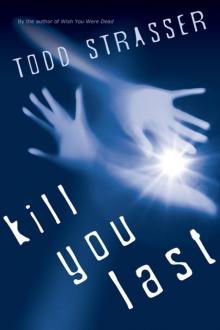 Kill You Last
Kill You Last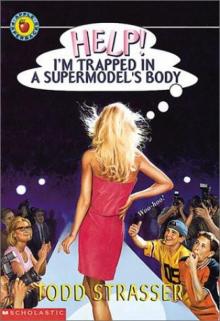 Help! I'm Trapped in a Supermodel's Body
Help! I'm Trapped in a Supermodel's Body Price of Duty
Price of Duty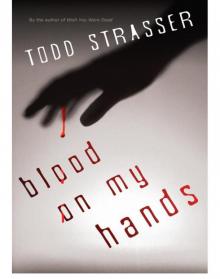 Blood on My Hands
Blood on My Hands Help! I'm Trapped in My Sister's Body
Help! I'm Trapped in My Sister's Body sidewayz glory
sidewayz glory The Beast of Cretacea
The Beast of Cretacea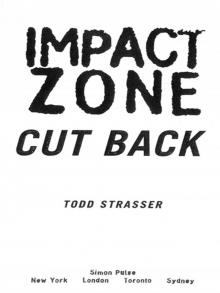 Cut Back
Cut Back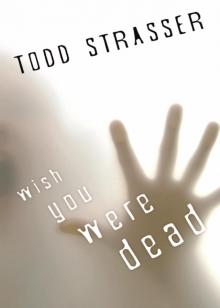 Wish You Were Dead
Wish You Were Dead The Wave
The Wave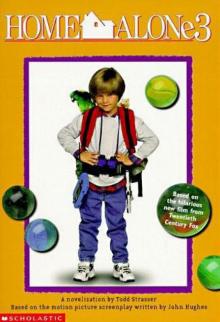 Home Alone 3
Home Alone 3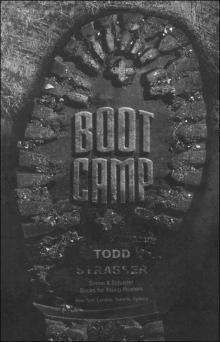 Boot Camp
Boot Camp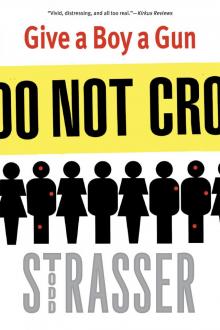 Give a Boy a Gun
Give a Boy a Gun Home Alone 2
Home Alone 2 The Shore
The Shore Can't Get There from Here
Can't Get There from Here Home Alone
Home Alone Close Out
Close Out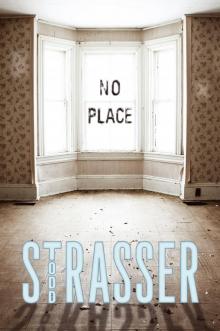 No Place
No Place Star Wars - Episode I Journal - Anakin Skywalker
Star Wars - Episode I Journal - Anakin Skywalker